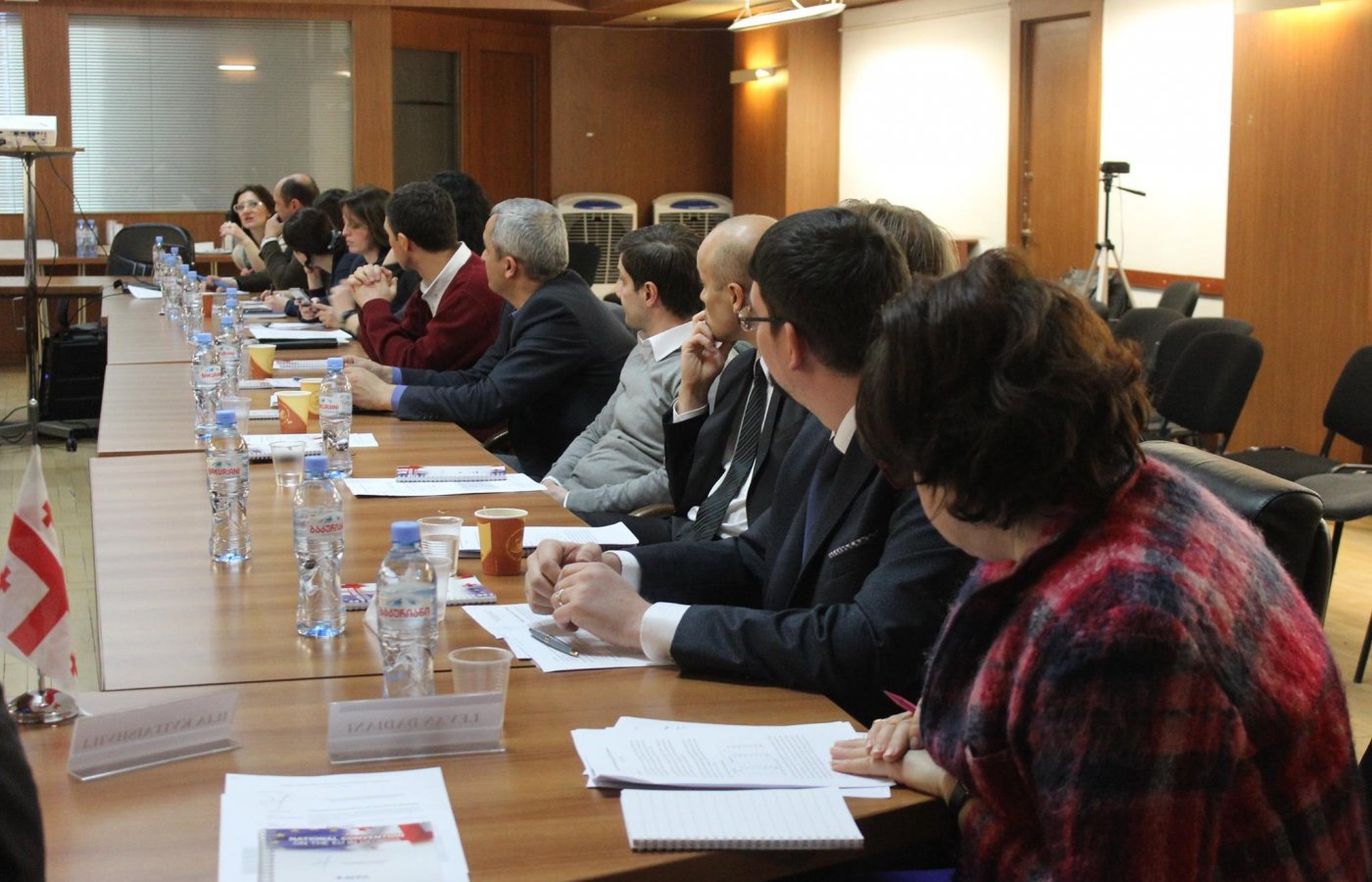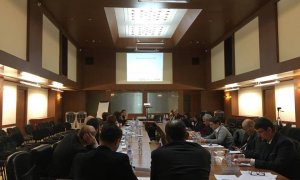On March 22, 2016 the Levan Mikeladze Foundation held the first meeting of Agriculture and Regional Development Working Group on the topic - “Smallholder Farmers and Agricultural Cooperation/Strengthening of target oriented investments”. The meeting was organized in the framework of the project - “National Convention on the EU in Georgia”. The project is carried out in partnership with the Slovak Foreign Policy Association (SFPA) and with the financial support of the Slovak Aid and Europe Foundation.
The meeting took place in the National Library of Georgia. It was chaired by Mr. Lasha Inauri, Deputy Head of Euro Integration Department of the Ministry of Agriculture of Georgia and by Mr. Ilia Kvitaishvili, founder of Rural and Agricultural Policy and Development Institute.
The working group was composed with representatives of government bodies, NGOs, diplomatic missions of various states and the Delegation of the European Union. In total, there were 23 organizations represented in the session. These organizations were:
- Action Contre La Faim (ACF) Georgia
- Agricultural Cooperatives Development Agency (ACDA)
- CARE International in the Caucasus
- Caucasus Environmental NGO Network
- Deutsche Gesellschaft für Internationale Zusammenarbeit (GIZ) GmbH : Local Governance Programme South Caucasus
- Elkana
- Europe Foundation
- Georgian Farmers Association
- Information Center on NATO and EU
- International Orthodox Christian Charities (IOCC)
- Mercy Corps
- Ministry of Regional Development and Infrastructure of Georgia
- Oxfam Georgia
- Policy and Management Consulting Group (PMCG)
- Rural and Agricultural Policy and Development Institute
- Slovak Foreign Policy Association (SFPA)
- Taso Foundation (TF)
- The Embassy of Slovakia to Georgia
- The Food and Agriculture Organization of the United Nations (FAO)/The European Neighbourhood Programme for Agriculture and Rural Development in Georgia (ENPARD – Georgia)
- The Levan Mikeladze Foundation (LMF)
- The Ministry of Agriculture of Georgia (MOA)
- The Ministry of Economy and Sustainable Development of Georgia
- Women’s Information Centre
During the Working Group meeting, two sets of recommendations, one drafted by Georgian expert Mr. Levan Dadiani and the second one prepared by Slovak expert, Mr. Marian Kovacik were presented and discussed.
In the presentation phase, Mr. Dadiani first talked generally about the agriculture sector in Georgia; in particular, he analysed the situation of Georgian farmers in terms of production, the salary, the share of agriculture in GDP and the competitiveness of Georgia in this field. Later on, the expert drew a clear link between the context analysed and the EU-Georgia Association Agreement. In relation with this, Mr. Dadiani discussed the government strategy and its action plan. His conclusions included remarks to government actions as well as a couple of sound predictions. Based on this, Mr. Dadiani proposed the list of recommendations aimed at improving the current situation of smallholder farmers and agricultural cooperation; additionally, he suggested a number of ways to strengthen target oriented investments.
The key findings and recommendations:
- Shift support from social projects to small holders to the economic ones through design, planning and implementation of capital investment grant schemes customized to the needs and capabilities of small holders. – Decrease allocation for loan interest rate subsidy scheme and re-allocate GEL50m p/annum during at least ten years (Use ENPARD consortia models for capital investment schemes);
- Two areas require immediate solution: 1. Tackling land registration problems; and 2. Developing farm register - These processes can be boosted and accelerated through: a. Introduction of direct subsidies for land registration; b. setting registration of privatized agricultural land as well as registration at the farm register as one of the eligibility criteria for the farmers’ inclusion into the state support and/or subsidy programs;
- Stipulate registered agricultural cooperatives to conduct non-banking depository and credit business (amendments in legislation, medium and long term investment and capacity building programs);
- Develop special long-term programs for integrating smallholders’ production into the state procurement schemes for supplying food items to the public institutions such as schools, kindergartens, state ministries, agencies and departments, parliament as well as military, penitentiary, police and public health institutions. This is a long term undertaking that requires to be conducted in parallel to local production productivity and quality improvement support schemes and measures;
- Give specific preferences to agricultural cooperatives in the process of privatizing state agricultural mechanization service - LTD ‘’Mechanizatori’’.
The second presentation was made by Slovak expert, Mr. Marian Kovacik. He talked about the situation in agriculture before Slovakia’s entry into the EU, including the pre-access negotiations (selected measures) and compared it to the situation afterwards, covering also the details of post-accession negotiations. He further elaborated his presentation by demonstrating the current state of agriculture sector in Slovakia. He put an extra emphasis on the complexity of this chapter in the negotiation process. In addition, the expert also discussed the challenges brought by the changes, such as the increase of investments due to cheap land prices, which later resulted in the elimination of local smallholders from the market, additionally, the new directives in terms of additional hygiene steps in production process and rise in minimum wage requirements led to the increase in prices, which translated into the switch to imported goods.
Both presentations were followed by a fruitful discussion. The Working Group members were interested in the social effect that the changes in agriculture sector due to the AA had on local citizens in Slovakia; in particular the questions were related to the employment opportunities and other potential economic benefits.
The issue of trust and the lack of support from the general public was also raised during the discussion. It was stated that due to the conservative character of farmers, it becomes difficult to persuade them in the positive outcomes that AA will bring, including the benefits of modern cooperatives. The root of this problem has been identified as the lack of knowledge of international markets and technological developments. In addition to this, farmers are not well informed about the food safety requirements, which makes it far more difficult to keep Georgian food products competitive; to address this obstacle, it is crucial to include awareness raising on this issue in agriculture support programs.
The role and the work of local municipalities as well as of the relevant ministries was also talked through. It has been argued that these bodies should intensify their work as to respond to challenges in this sector, such as high rate of urbanization due to the lack of opportunities in rural areas, increased income gap and increased prices.

